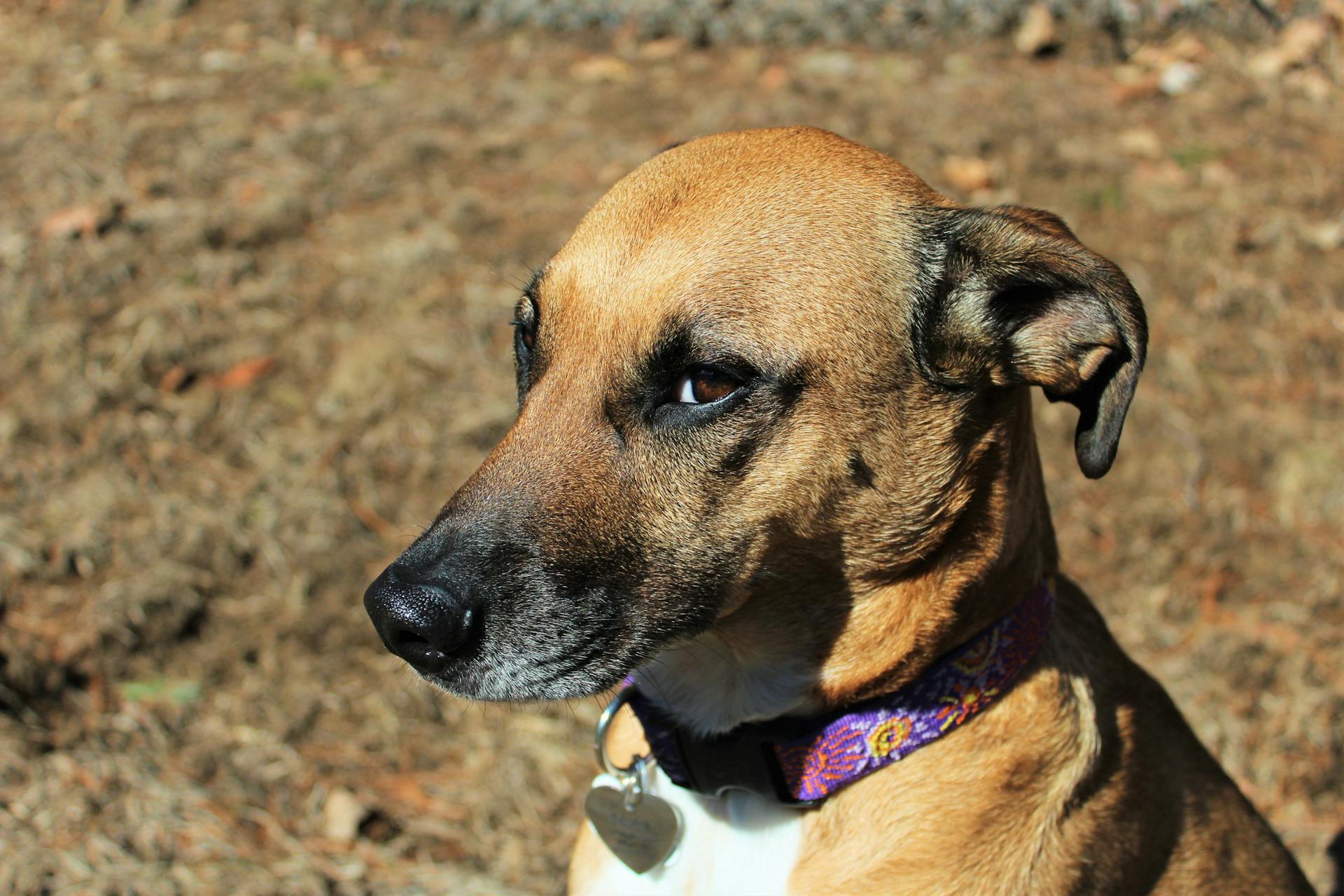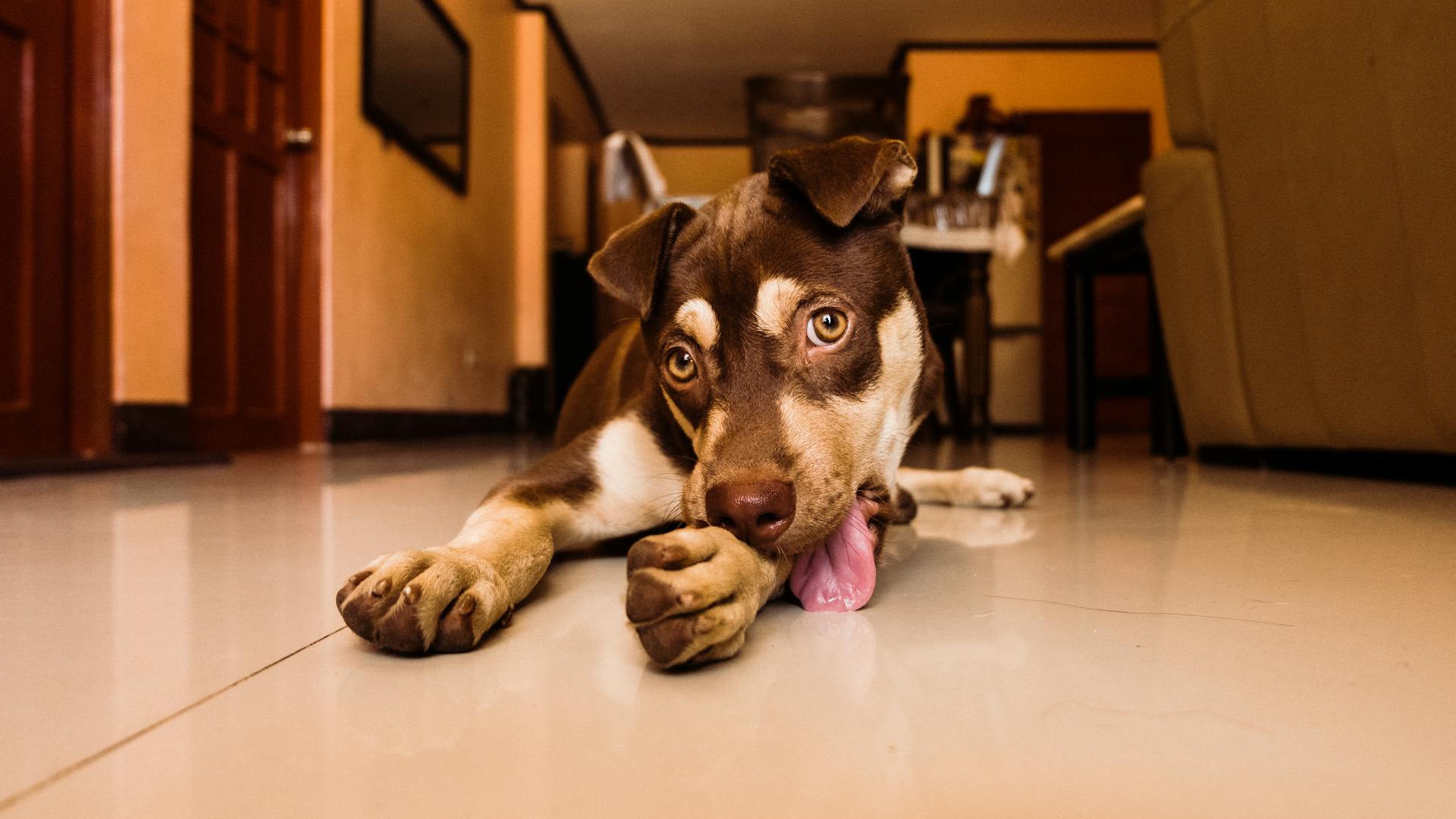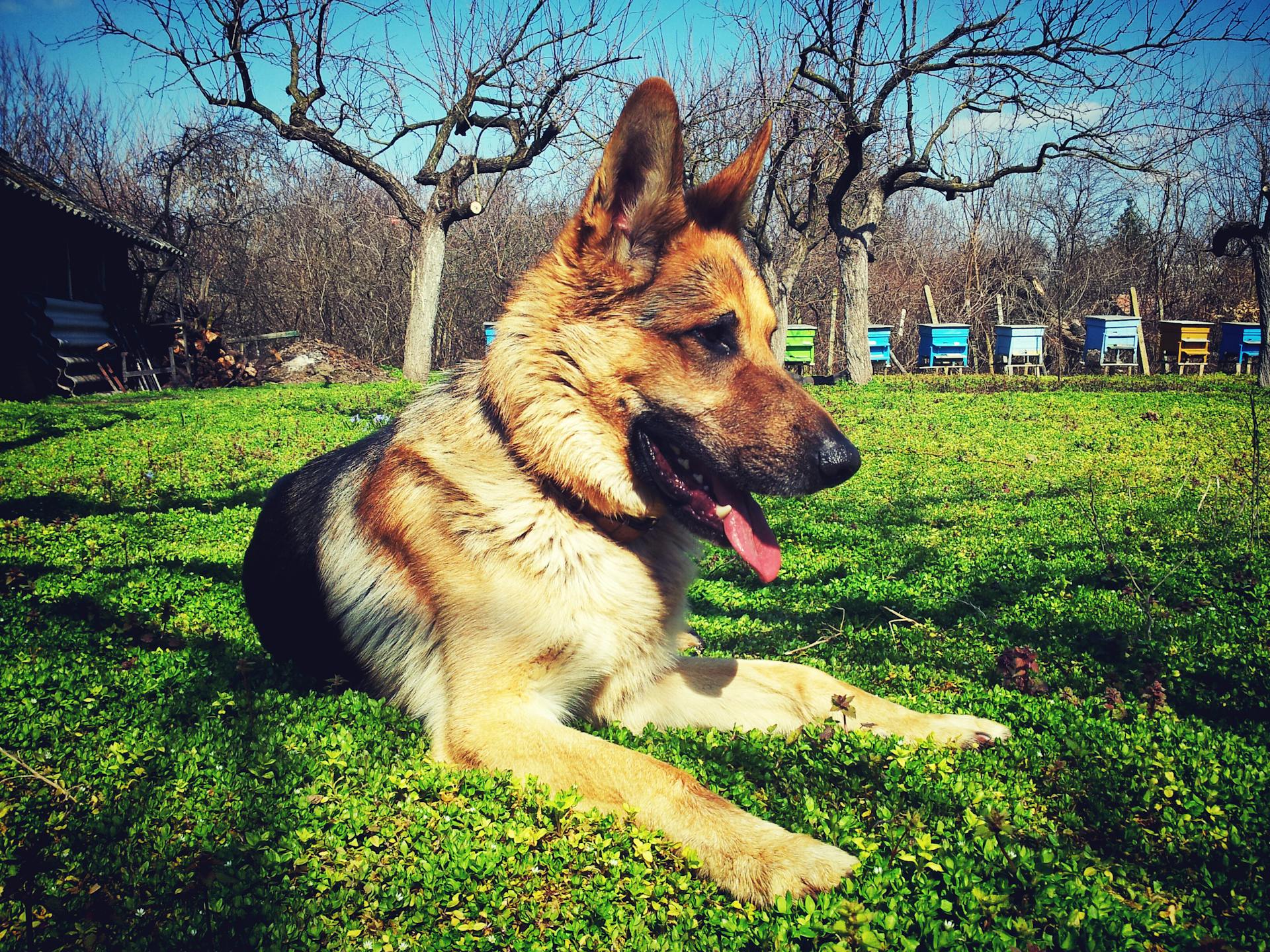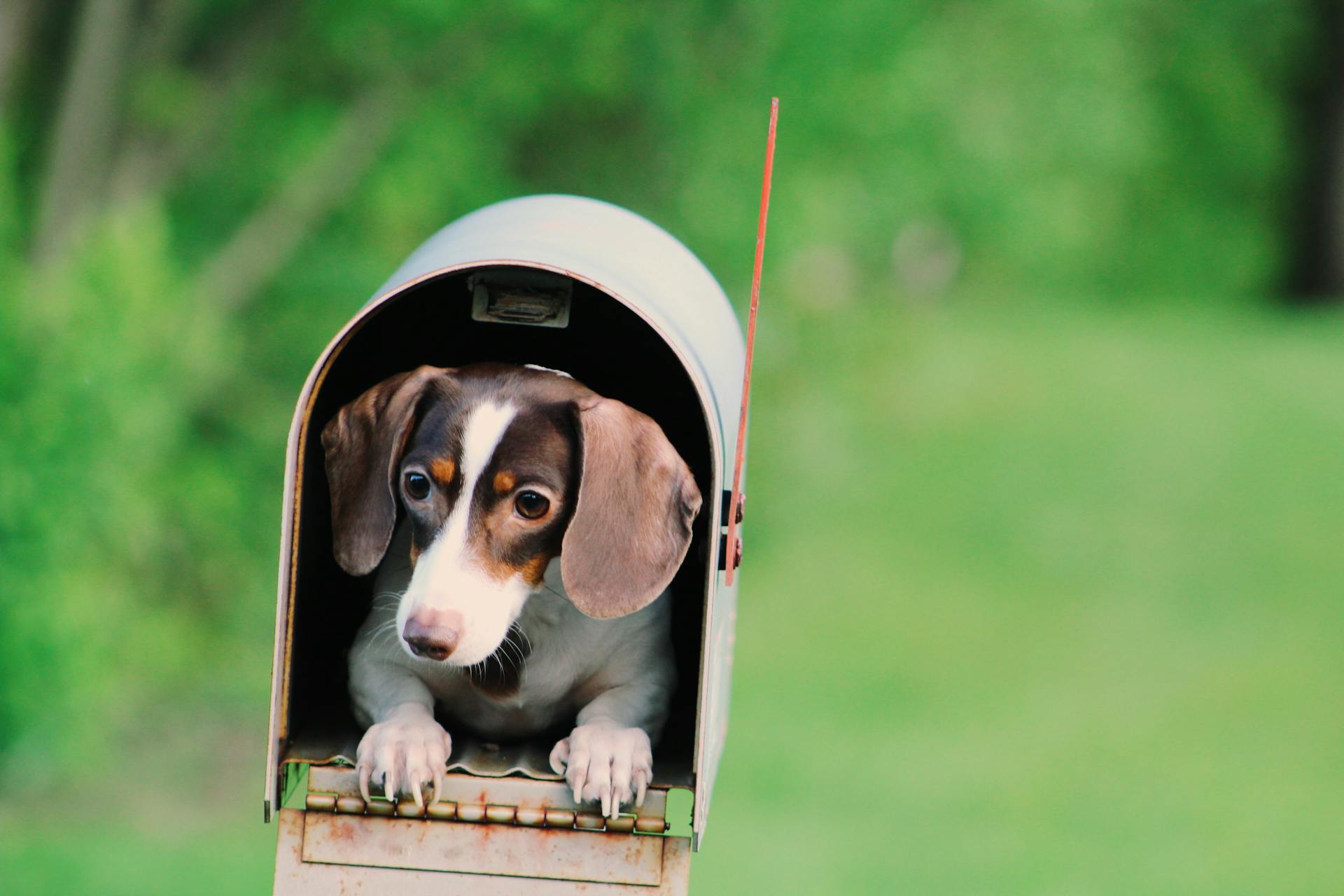
If your dog has ingested onion powder, it's essential to act quickly to minimize the risk of harm.
Onion powder can cause severe damage to your dog's red blood cells, leading to anemia.
Symptoms of onion powder toxicity can appear within 24 hours of ingestion and may include vomiting, diarrhea, and lethargy.
In severe cases, onion powder can cause a condition called hemolytic anemia, which can be life-threatening if not treated promptly.
Causes and Effects
Dogs are more susceptible to onion poisoning due to their inability to digest onions and other plants in the allium family. Certain breeds like Japanese breeds, such as the Akita and Shiba Inu, are more prone to this issue.
Feeding food prepared for humans to a dog can also lead to onion poisoning. This can happen if you're cooking with onions and leaving the kitchen unattended, allowing your dog to get into the food.
Onion powder can be hidden in a range of human foods, including sauces, soups, stock, and seasonings, which is why onion poisoning is a big risk for sneaky snackers.
For your interest: Dog Breeds Watch Dogs
Some factors can make a dog's red blood cells weaker and increase their susceptibility to onion poisoning. These include zinc deficiency, glucose-6-phosphate dehydrogenase deficiency, and certain drug treatments.
Ingestion of fresh growing onions, garlic, or chives is also a risk factor for onion poisoning. This can happen if your dog gets into your garden or if you're not storing onions properly.
Here are some common causes of onion poisoning in dogs:
- Ingestion of fresh growing onions, garlic, or chives
- Feeding food prepared for humans to a dog
- Dog chews open a container of dried or powdered onions or garlic
- Certain breeds are more susceptible (Japanese breeds like Akita and Shiba Inu)
- Some factors can make the red blood cells weaker and increase a dog’s susceptibility to allium species toxicosis
Symptoms
If your dog ate onion powder, it's essential to watch out for these symptoms. Lethargy is a common sign, and it can be accompanied by a weakened state.
Diarrhea and vomiting are also possible, especially if the amount of onion powder consumed was high. Mouth irritation and panting too much can occur as well.
Keep an eye out for reddish urine, which is a sign that your dog's kidneys are being affected. Pale gums and weakness can also be indicators of onion powder toxicity.
Here are some key symptoms to look out for:
- Lethargy
- Vomiting
- Diarrhea
- Mouth irritation
- Panting too much
- Reddish urine
- Weakness
- Pale gums
If you notice any of these symptoms, it's crucial to seek immediate medical attention. Early treatment can make a significant difference in your dog's recovery.
Treatment
If your dog has eaten onion powder, you need to act fast. Time is of the essence, as onion toxicity can be fatal if left untreated.
Inducing vomiting may be necessary to get the onion powder out of your dog's system faster. Your vet will provide supportive care as needed to treat your dog while they wait for healthy red blood cells to replace the damaged ones.
A typical treatment plan may include inducing vomiting, followed by a dose of activated charcoal to reduce absorption in the gastrointestinal tract. Your vet will also monitor your dog for signs of anemia over the next few days.
If a large amount of onion powder has been ingested, your dog may need to be kept in a veterinary hospital for the time period. Severely ill dogs will likely need supplemental oxygen to make up for the reduced circulation of red blood cells and a blood transfusion could be necessary to stabilize your dog until the bone marrow is able to generate enough new, healthy erythrocytes.
Readers also liked: Dog Ate Tiny Piece of Onion
Dogs will likely recover from mild exposure to onions or garlic, but severe poisoning can be fatal, especially without treatment. If you know you dog has eaten an excessive amount of onion powder, you should take him to the vet immediately even if there are no immediate signs.
Here's a list of symptoms to look out for:
- Diarrhea
- Vomiting
- Lethargy
- Mouth irritation
- Panting too much
- Collapsing
- Sensitive stomach
- Reddish urine
- Weakness
- Pale gums
Speed matters, so get your dog to the vet as fast as possible to avoid any long-lasting effects.
Prevention and Emergency
Prevention is key when it comes to onion toxicity in dogs, and storing onions and other allium vegetables out of reach is a crucial step. This will help prevent your dog from accessing them.
If your dog does eat onions, speed matters - onion toxicity can be fatal, and the longer it's left untreated, the worse it can get. The faster you can get your dog to the vet, the more treatable the condition will be.
Broaden your view: Dog Onion Toxicity Calculator
To prevent onion toxicity, you should also avoid feeding your dog table scraps, even if they beg, and read food labels carefully to check for onion powder and other unsafe seasonings. Educate family and houseguests so they understand the risks.
Here's a list of steps to take if you suspect your dog has eaten onion powder:
- Contact your vet for advice
- Provide the age, size, and breed of your pet, when they ate the onion, the specific type of food they ate, and how much onion they ate
- Provide any unusual symptoms or behavioral changes
The ASPCA Animal Poison Control Helpline is also available 24/7 to provide support and answer any questions.
How to Prevent
Prevention is the best way to keep your pet safe from onion toxicity. Store onions and other allium vegetables out of reach, as dogs will eat just about anything within reach.
To avoid feeding your dog table scraps, even if they beg, is crucial. This includes not giving them onion powder and other unsafe seasonings found in some foods.
Educating family and houseguests about the risks of onion toxicity is also essential. This way, everyone can be on the same page and help keep your pet safe.
Here are some key steps to prevent onion toxicity in pets:
- Store onions and other allium vegetables out of reach
- Avoid feeding your dog table scraps
- Read food labels carefully
- Educate family and houseguests
Is an Emergency?
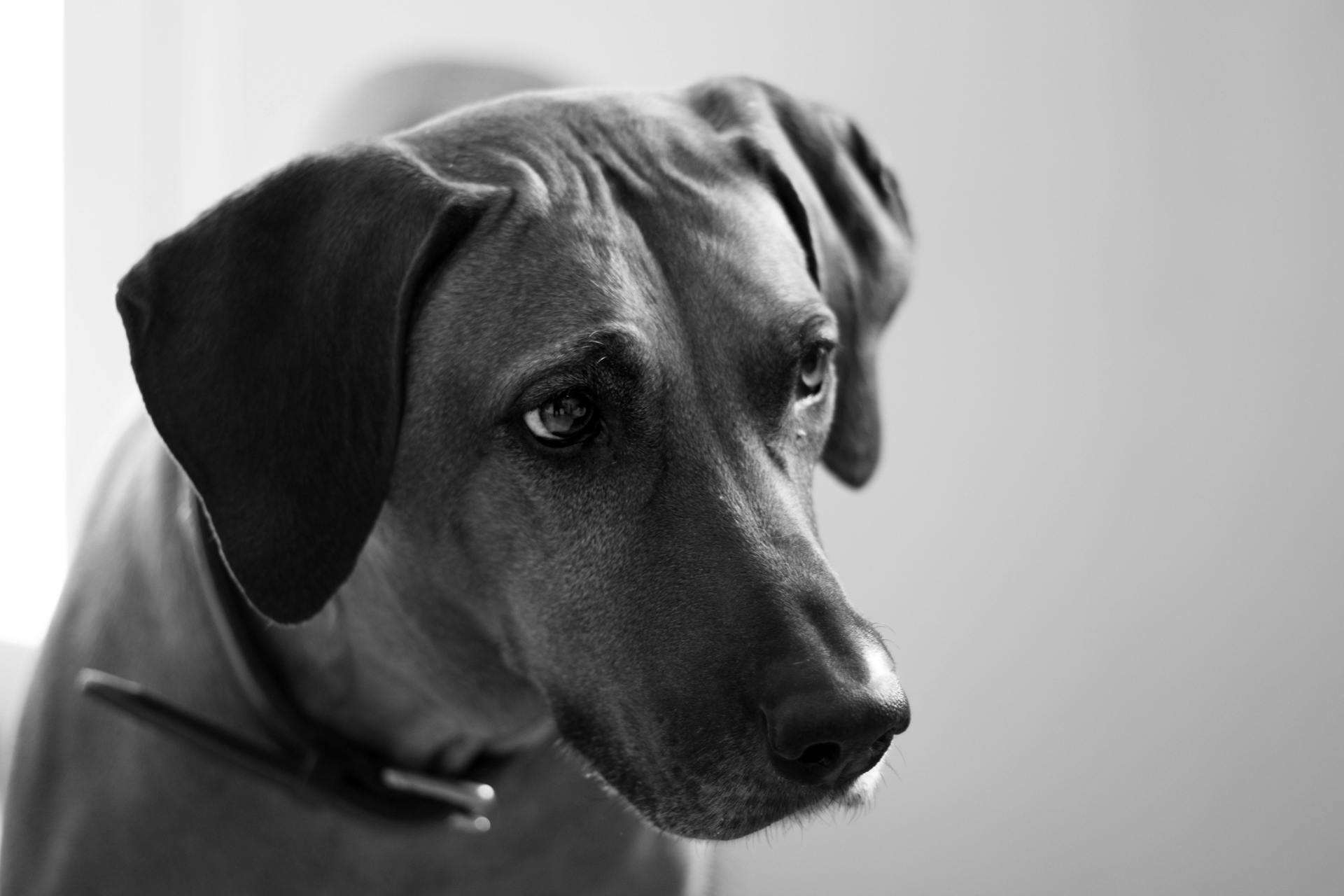
If your dog ate onions, it's a good idea to take them to the emergency vet right away. Onion toxicity in dogs can be life-threatening.
Speed matters when it comes to treating onion toxicity. The faster you get your dog to the vet, the more treatable the condition will be.
Onion ingestion is a common problem, and it's often caused by cooking and leftovers. Raw onion is less likely to be a problem because its toxicity is more obvious.
Toxin absorption can be prevented by inducing vomiting, but this needs to be done by a vet. If the onion has been absorbed, daily blood tests are needed to monitor anaemia.
The toxic dose of onion is low, and pets vary in their sensitivity to it. Even a tiny amount can cause problems, so it's always best to err on the side of caution and see a vet if you suspect onion toxicity.
On a similar theme: Vets Dog Treats
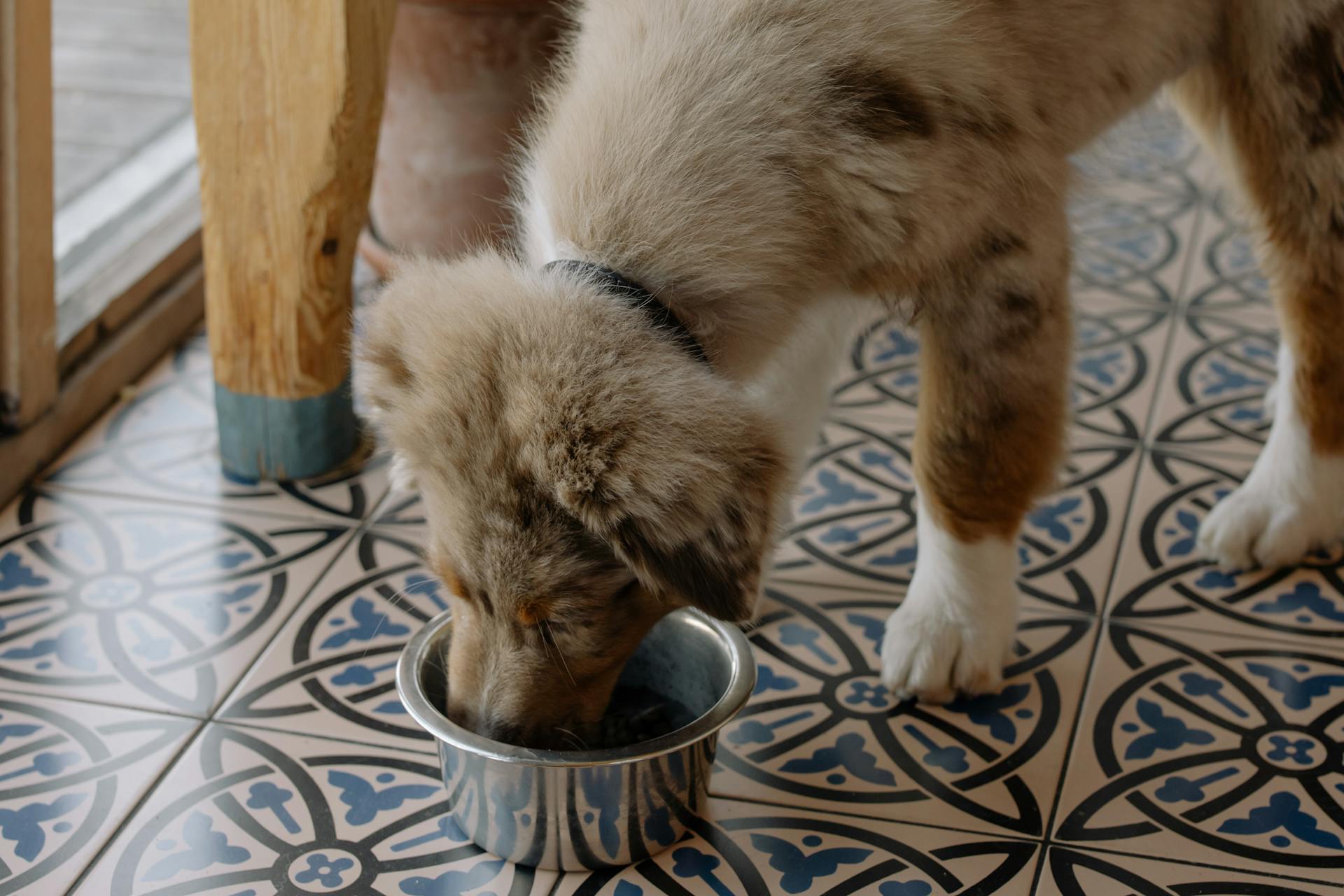
Here are some key things to remember:
- Take your dog to the emergency vet if you know they've eaten onions or if you see signs of onion toxicity.
- Speed is crucial in treating onion toxicity, so get to the vet as quickly as possible.
- Even small amounts of onion can cause problems, so see a vet if you're unsure.
What to Do If My Dog Eats
If your dog eats onions, it's essential to act fast. Even a small amount can be toxic to your pet. The ASPCA Animal Poison Control Helpline is available 24/7 to provide support and answer any questions.
The first step is to contact your vet for advice, and if they're unavailable, head to an animal hospital. You'll need to provide information about your dog's age, size, breed, when they ate the onion, the specific type of food they ate, and how much onion they consumed.
Symptoms of onion toxicity can start quickly, but most commonly appear a few days after ingestion. Look out for signs like diarrhea, vomiting, lethargy, mouth irritation, panting too much, collapsing, sensitive stomach, reddish urine, weakness, and pale gums.
If you know your dog ate more than 0.5% of their body weight in onions, take them to the vet right away. If you're unsure, keep a close eye on your dog and monitor their symptoms.
Here's a list of symptoms to watch out for:
- Diarrhea
- Vomiting
- Lethargy
- Mouth irritation
- Panting too much
- Collapsing
- Sensitive stomach
- Reddish urine
- Weakness
- Pale gums
Speed matters when it comes to treating onion toxicity. The faster you can get your dog to the vet, the more treatable the condition will be.
Frequently Asked Questions
Is onion or garlic more toxic to dogs?
Garlic is significantly more toxic to dogs than onions, with a toxicity level about five times higher. If you suspect your dog has ingested either, consult a veterinarian immediately for guidance.
How toxic is garlic powder to dogs?
Garlic powder is highly toxic to dogs, causing damage to red blood cells, gastrointestinal upset, and respiratory problems. Even small amounts can be hazardous, so it's best to avoid giving garlic powder to your furry friend altogether.
Sources
- https://windermerevetservices.com/what-should-you-do-if-your-dog-eats-onions/
- https://wagwalking.com/condition/onions-poisoning
- https://www.walkervillevet.com.au/blog/help-my-dog-ate-onion/
- https://www.pumpkin.care/blog/can-dogs-eat-onions/
- https://cooperpetcare.com/can-dogs-eat-onions-heres-why-they-shouldnt/
Featured Images: pexels.com
